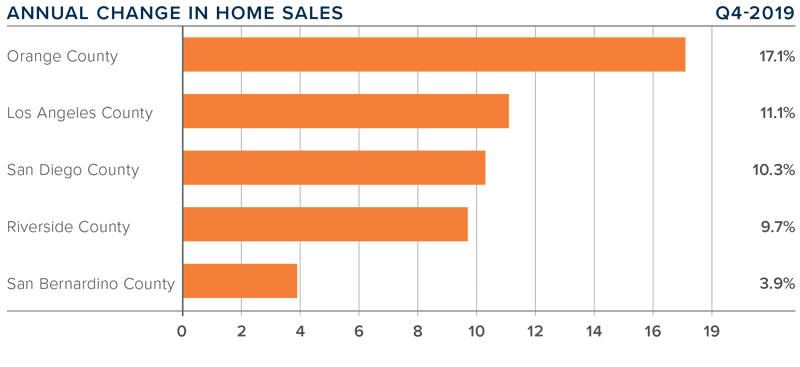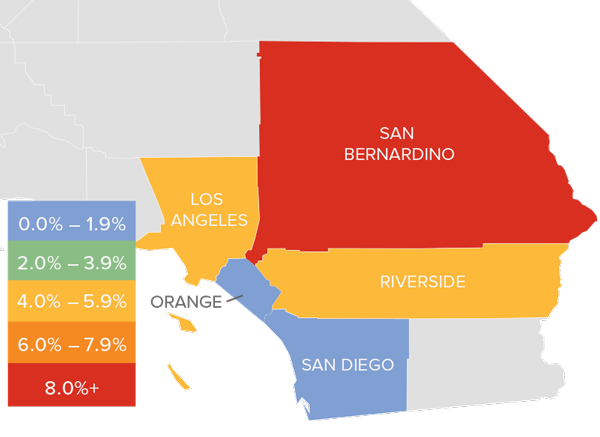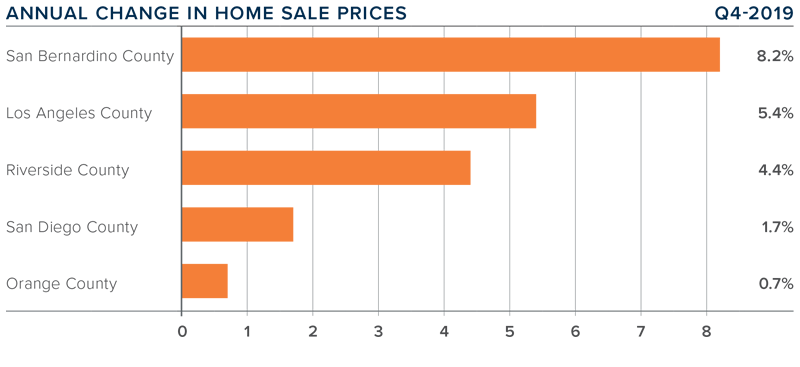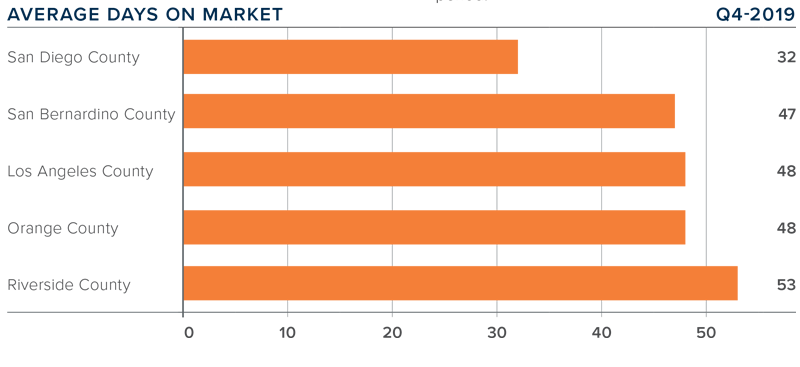The following analysis of the Southern California real estate market is provided by Windermere Real Estate Chief Economist Matthew Gardner. We hope that this information may assist you with making better-informed real estate decisions. For further information about the housing market in your area, please don’t hesitate to contact me.
ECONOMIC OVERVIEW
The counties covered by this report — Los Angeles, San Diego, San Bernardino, Orange, and Riverside — saw total employment rise 54,500 jobs (+0.5%) year-over-year, an improvement compared to employment growth in the third quarter of 2019. Job growth rose in all but Orange County, which saw a contraction of 8,900 jobs.
The region’s unemployment rate dropped from 3.9% to 3.6% over the past year, with the total number of unemployed persons down 25,900 persons year-over-year. In all, these are reasonable numbers, though employment growth in this region remains lower than in other West Coast states.
HOME SALES
- There were 43,915 homes sold in the final quarter of 2019. This was an impressive increase of 10.7% over the same period in 2018, but 10.8% lower than in the third quarter of the year (likely a function of seasonality).
- Pending home sales (an indicator of future closings) rose 18.4% compared to a year ago but dropped 17.1% from the third quarter of 2019.
- Fourth quarter home sales rose in all counties contained in this report. Of note was a significant increase in Orange County, where over 1,000 more units changed hands than in the final quarter of 2018.
- There was an average of 31,380 active listings in the fourth quarter — down 23.3% from a year ago and 20% lower than in the third quarter of the year. The market is tighter than I would like, but there is clearly demand from buyers.

HOME PRICES

- Year-over-year, home prices in the region were 4.6% higher. They were 1.3% higher than in the third quarter of 2019.
- Affordability concerns persist but buyers in the region still seem able to pay more for housing. That said, I maintain my position that price growth will continue to slow—though remain positive—as we move through 2020.
- Home prices were higher in all counties contained in this report, with San Bernardino County holding onto the number one spot for price growth (+8.2%). Los Angeles and Riverside counties also saw significant price gains.
- In 2020, I expect home prices will rise and mortgage rates should remain below 4%.

DAYS ON MARKET
- The average time it took to sell a home in the region was 45 days, which is 1 day fewer than a year ago, but 3 days more than the third quarter.
- Two markets — San Diego and Riverside — saw the time it took to sell a house drop compared to the final quarter of 2018.
- Homes in San Diego County continue to sell at a faster rate than other markets in the region. In the final quarter of 2019, it took an average of 32 days to sell a home. This is 3 fewer days than it took a year ago.
- Market time dropped compared to a year ago, and I think we may see further contraction as we move into the more buoyant spring sales period.

CONCLUSIONS
 The speedometer reflects the state of the region’s real estate market using housing inventory, price gains, home sales, interest rates, and larger economic factors. Inventory levels and affordability concerns persist, but there still appears to be demand from home buyers. Pending sales have risen, which suggests the market still has legs to grow, thanks in no small part to competitive mortgage rates. Given the tight inventory levels and decent demand, I have moved the needle a little more toward sellers.
The speedometer reflects the state of the region’s real estate market using housing inventory, price gains, home sales, interest rates, and larger economic factors. Inventory levels and affordability concerns persist, but there still appears to be demand from home buyers. Pending sales have risen, which suggests the market still has legs to grow, thanks in no small part to competitive mortgage rates. Given the tight inventory levels and decent demand, I have moved the needle a little more toward sellers.
ABOUT MATTHEW GARDNER
 As Chief Economist for Windermere Real Estate, Matthew Gardner is responsible for analyzing and interpreting economic data and its impact on the real estate market on both a local and national level. Matthew has over 30 years of professional experience both in the U.S. and U.K.
As Chief Economist for Windermere Real Estate, Matthew Gardner is responsible for analyzing and interpreting economic data and its impact on the real estate market on both a local and national level. Matthew has over 30 years of professional experience both in the U.S. and U.K.
In addition to his day-to-day responsibilities, Matthew sits on the Washington State Governors Council of Economic Advisors; chairs the Board of Trustees at the Washington Center for Real Estate Research at the University of Washington; and is an Advisory Board Member at the Runstad Center for Real Estate Studies at the University of Washington where he also lectures in real estate economics.
 Facebook
Facebook
 X
X
 Pinterest
Pinterest
 Copy Link
Copy Link



